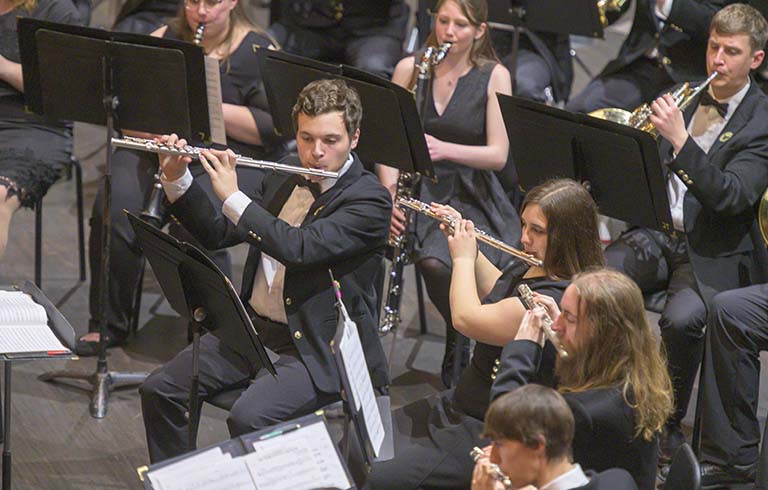Exploring the Baroque Influence in Trine University’s Wind Ensemble Concert

Unveiling the Baroque Style in Contemporary Wind Ensemble Performances
Music has a unique way of connecting generations through historical styles and modern interpretations. At Trine University, the upcoming spring concert by the Wind Ensemble exemplifies this bridge between tradition and contemporary experimentation. Titled That’s Not Baroque, the concert promises a musical voyage that evokes the grandeur and drama of the Baroque era while incorporating modern orchestral techniques. For enthusiasts of classical music and performing arts, this performance offers a fascinating exploration of how historical musical styles can be reimagined in today’s context.
The Significance of Baroque Music and Its Artistic Features
The Baroque period, spanning from roughly 1600 to 1750, is renowned for its expressive richness, ornamentation, and elaborate compositional techniques. Composers like Johann Sebastian Bach, George Frideric Handel, and Antonio Vivaldi created works characterized by intricate counterpoint, dramatic contrasts, and ornate textures. These elements contributed to a style that was both grand and emotionally intense, aimed at evoking deep feelings in the listener.
Many of the pieces from this era, such as preludes, fugues, and chorales, are marked by distinctive musical structures like ostinatos and complex fugues. These features continue to influence the evolution of Western classical music and are still studied and performed today. Interestingly, the Baroque style’s emphasis on ornamentation and dramatic contrasts remains inspiring for modern composers and performers looking to infuse their work with expressive depth.
Modern Interpretations and the Role of Wind Ensembles
While the core of Baroque music is rooted in the compositions for strings, keyboards, and early wind instruments, contemporary wind ensembles often draw inspiration from this era to craft innovative performances. Trine University’s wind ensemble, under the guidance of Dr. Brad Jopek, interprets this historical style through a modern lens, blending period motifs with 20th and 21st-century musical idioms.
The concert That’s Not Baroque presents a curated selection of works that evoke the spirit of the Baroque, even if they are not strictly from that period. For example, selections like “Passacaglia” by Anne McGinty or “Elegy for Albinoni” by Shelley Hanson adopt Baroque structures such as passacaglias and chorales, which showcase the enduring influence of this style. Additionally, performances like “Bayou Breakdown” add a Cajun flavor, illustrating how musical styles can cross cultural and temporal boundaries.
Featured Repertoire and Its Musical Elements
The concert repertoire includes a variety of pieces that highlight different aspects of Baroque-influenced music:
- “A Festival Prelude” by Alfred Reed: An energetic opening that sets a celebratory tone, drawing from the grandeur typical of Baroque festival music.
- “Passacaglia” by Anne McGinty: A piece based on the passacaglia form, emphasizing repetitive bass lines and intricate variations, a hallmark of Baroque formal innovation.
- “Coronation March” from Le Prophet by Giacomo Meyerbeer, arranged by James Ployhar: A march that echoes the regality and grandeur associated with royal ceremonies in the Baroque era.
- “Elegy for Albinoni” by Shelley Hanson: A reflective piece inspired by the Baroque-era composer Tomaso Albinoni, famed for his lamenting melodies.
- “Bayou Breakdown” by Brant Karrick: An energetic Cajun tune that demonstrates how Baroque motifs can be integrated into diverse musical genres.
- “Meditation” by Dwayne S. Milburn: A contemplative piece that echoes the meditative qualities often found in Baroque music.
- “Finale” from Symphony No. 3 “Organ” by Camille Saint-Saëns: An orchestral finale showcasing virtuosic and elaborate textures, reminiscent of Baroque climax techniques.
Engaging the Audience with a Blend of History and Creativity
This concert exemplifies how modern performers and composers interpret and recontextualize Baroque elements. For students at Trine University and the wider community, such performances deepen appreciation for musical history while highlighting innovation. The inclusion of student chamber ensembles and guest performers demonstrates the university’s commitment to fostering emerging talent within the performing arts.
Music students and enthusiasts are encouraged to explore the intricacies of Baroque music and its enduring influence. Attending the concert provides an opportunity to witness firsthand how historical styles continue to inspire contemporary music, resonating across different cultures and musical traditions.
Experience the Concert and Discover the Richness of Classical Heritage
Whether you are a seasoned classical music lover or new to the genre, the Trine University Wind Ensemble’s That’s Not Baroque concert offers an insightful and stimulating experience. The event is scheduled for Sunday, April 27, at 3 p.m. in the Ryan Concert Hall of the T. Furth Center for Performing Arts. The best part? The concert is free and open to the public, making it accessible for all who wish to appreciate the depth and beauty of this musical era.
If you’re interested in supporting the performing arts and exploring more about Trine University’s vibrant music program, consider participating in upcoming events or enrolling in related music courses. For those passionate about pursuing a career in music or performing arts, Trine offers a comprehensive program designed to nurture talent and creativity.
Take the Next Step in Your Performing Arts Journey
For aspiring musicians and dedicated students, Trine University’s performing arts programs provide a platform to develop skills and engage with professional-level performances. Explore options for undergraduate or graduate studies, or participate in summer camps and workshops designed to enhance musical proficiency.
Discover if Trine University’s music department is the right fit for your ambitions. Request more information today to learn about admissions, scholarships, and campus opportunities.
Whether you’re attending the concert or considering a degree in music and performing arts, Trine University remains committed to fostering a lifelong passion for music. Join us and experience a celebration of musical heritage intertwined with contemporary creativity.

